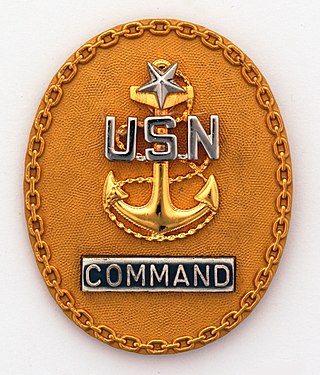
A non-commissioned officer (NCO) is a military officer who does not hold a commission. Non-commissioned officers usually earn their position of authority by promotion through the enlisted ranks. In contrast, commissioned officers usually enter directly from a military academy, officer training corps (OTC) or reserve officer training corps (ROTC), or officer candidate school (OCS) or officer training school (OTS), after receiving a post-secondary degree.

In a navy, a rate, rating or bluejacket is a junior enlisted sailor who is not a warrant officer or commissioned officer. Depending on the country and navy that uses it, the exact term and the range of ranks that it refers to may vary.
A chief petty officer (CPO) is a senior non-commissioned officer in many navies and coast guards, usually above petty officer.
Senior Chief Petty Officer(SCPO) is an enlisted rank in the navies of some countries.
Master chief petty officer (MCPO) is an enlisted rank in some navies. It is the ninth enlisted rank in the United States Navy and United States Coast Guard, just above Senior Chief Petty Officer (SCPO). Master chief petty officers are addressed as "Master Chief " in colloquial contexts. They constitute the top 1.25% of the enlisted members of the maritime forces.

The Master Chief Petty Officer of the Navy is a unique non-commissioned rank and position of office of the United States Navy, which is designated as a special paygrade above E-9. The holder of this position is the most senior enlisted member of the U.S. Navy, equivalent to the Sergeant Major of the Army, Chief Master Sergeant of the Air Force, Sergeant Major of the Marine Corps, Master Chief Petty Officer of the Coast Guard, and Chief Master Sergeant of the Space Force. The holder of this rank and position is the most senior enlisted sailor in the Navy, unless an enlisted sailor is serving as the Senior Enlisted Advisor to the Chairman. The current MCPON is James Honea.
A petty officer (PO) is a non-commissioned officer in many navies and is given the NATO rank denotation OR-5 or OR-6. In many nations, they are typically equal to a sergeant in comparison to other military branches. Often they may be superior to a seaman, and subordinate to more senior non-commissioned officers, such as a chief petty officers.
Petty officer first class (PO1) is a rank found in some navies and maritime organizations.
Chief warrant officer is a senior warrant officer rank, used in many countries.

The Meritorious Service Medal (MSM) is a military award presented to members of the United States Armed Forces who distinguished themselves by outstanding meritorious achievement or service to the United States subsequent to January 16, 1969.

The chief of the boat (COB) is an enlisted sailor on board a U.S. Navy submarine who serves as the senior enlisted advisor to both the Commanding Officer (CO) and Executive Officer (XO).
This article covers the organization of the United States Coast Guard.

Bataan Military Academy was a tuition-free, co-ed, college-prep public day high school. All cadets were members of the Navy Junior Reserve Officers Corps, the U.S. Navy's youth organization. Bataan opened at the beginning of the 2007–2008 school year with freshmen and sophomores. The school closed at the end of the 2015–2016 school year due to declining enrollment.
Chief Petty Officer (CPO) is the seventh enlisted rank in the United States Navy and U.S. Coast Guard, just above Petty Officer First Class and below Senior Chief Petty Officer. The term "rating" is used to identify enlisted job specialties. In this way, enlisted personnel are segregated into three segments containing different enlisted ranks. Furthermore, rates are broken down into three levels: non-rated members without a designated occupation. Advancement to E-4 and above is dependent on graduating from a specialty school that define what the enlisted is rated for. Petty officers and chief petty officers are part of the rated force and considered extremely knowledgeable about their particular rating. Examples include Culinary Services Chief and Aviation Maintenance Chief. The Chief Petty Officer is the rank. Gunners Mate is a rating. E7 is a pay grade. The term rating is used to identify the career field of a chief petty officer. For example, the title of a chief petty officer in the Master-at-Arms rating would be spoken or spelled out as Master-at-Arms, Chief Petty Officer or Chief Master-at-Arms. The title would be abbreviated MAC. The grade of chief petty officer was established on 1 April 1893 in the United States Navy. The United States Congress first authorized the Coast Guard to use the promotion to Chief Petty Officer on 18 May 1920. Chief petty officer is also the final cadet grade in the United States Naval Sea Cadet Corps.
The New Year Honours 1916 were appointments by King George V to various orders and honours to reward and highlight good works by members of the British Empire. They were announced on 1 January 1916.
The 1944 King's Birthday Honours, celebrating the official birthday of King George VI, were announced on 2 June 1944 for the United Kingdom and British Empire, New Zealand, and South Africa.
The King's Birthday Honours 1943 were appointments by King George VI to various orders and honours to reward and highlight good works by people of the British Empire. They were published on 2 June 1943 for the United Kingdom and Canada.
This page is based on this
Wikipedia article Text is available under the
CC BY-SA 4.0 license; additional terms may apply.
Images, videos and audio are available under their respective licenses.





